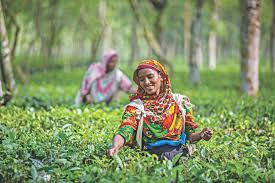ALIF
Published:2020-09-10 22:34:47 BdST
Northern Bangladesh sees booming tea sector
The booming tea sector in the ‘Kartoa Valley’ ecological zone comprising five districts in northern Bangladesh effectively changes the economy improving the living standard of thousands of people.
Officials of Bangladesh Tea Board (BTB) at Panchagarh regional office said the ‘small-scale gardening-basis’ tea cultivation continued expanding along with related activities even during the coronavirus (Covid-19) pandemic in the valley.
The production of ‘made-tea’ is likely to cross the 10 million kg mark this year in the valley comprising of Panchagarh, Thakurgaon, Dinajpur, Nilphamari and Lalmonirhat districts where an all-time record 9.59 million kg ‘made-tea’ was produced last year.
Senior Scientific Officer at Bangladesh Tea Research Institute Dr Mohammad Shameem Al Mamun narrated the history of launching tea farming and its rapid growth in the ‘Kartoa Valley’.
“Being directed by the then Prime Minister Sheikh Hasina during her visit to Panchagarh in 1996, the then Deputy Commissioner Rabiul Islam planted some tea saplings locally in Panchagarh on experimental basis,” he said.
Following better results, BTB scientists conducted feasibility study in Panchagarh and Thakurgaon in 1999 and found 16,000 hectares of land suitable for tea cultivation on commercial basis.
“Later, Tentulia Tea Company Limited (TTCL) first started commercial basis tea farming in Tentulia upazila of Panchagarh in 2000,” said Shameem, also Project Director of the Northern Bangladesh Project of BTB at its regional office.
Following the continuous success of TTCL, local farmers started commercial-basis tea cultivation on the `small-scale gardening-basis’ in the valley ushering in a new horizon in the agriculture economy.
“Owners of nine registered and 19 unregistered gardens and 6,558 small holders brought 8,680.68 acres of lands under tea cultivation by December, 2019 when they produced 46.9 million kg of green tea-leaves in the valley,” Shameem said.
“After processing of produced green tea-leaves, 18 tea processing factories produced 95.99 lakh (9.59 million) kg of ‘made-tea’ in 2019,” he said, adding that ‘made-tea’ production might cross the 10million kg mark this year.
Tea cultivation started expanding rapidly since launching of the ‘Expansion of Small Holding Tea Cultivation in Northern Bangladesh Project’ by BTB in 2015 at Taka 49.7 million to bring more 500 hectares of land within 2020 in the valley.
“With continuous expansion of tea cultivation on `small-scale gardening-basis’, production of green tea leaves is boosting every year creating jobs for thousands of tea workers, mostly women, in the valley,” Shameem added.
President of Bangladesh Small Tea Garden Owners’ Association Amirul Haque Khokan today said tea cultivation on `small-scale gardening-basis’ has ushered in a new perspective to change fortune of local farmers.
“As tea cultivation continues boosting in the valley, some 25,000 unemployed people, including around 15,000 women have changed their fortune by plucking tea-leaves and other related-activities in the valley,” Khokan said.
The labourers are currently earning Taka 500 to Taka 600 as daily wages in cash by plucking green tea leaves in groups of 10 to 20 male and female to lead a solvent life.
“Earlier, rural women passed hard days even 12 years ago due to poverty, but they have come out of the vicious cycle of poverty to lead better now with a dream of a better future for children following economic well-being,” Khokan added.
Smallholder tea grower Shahinur Rahman of village Buraburi in Tentulia upazila of Panchagarh said he started `small-scale gardening-basis’ tea cultivation on his plain land in 2016.
“I am cultivating tea on my 5.50 acres of land and selling my green tea leaves to tea processing companies at excellent rates between Taka 25 and Taka 30 per kg,” Rahman said, adding that he is earning excellent from tea cultivation.
Smallholder tea grower Abdul Malek of village Goalpara in Panchagarh Sadar upazila said he is cultivating tea on one bigha of land and selling his plucked green tea leaves at rates between Taka 25 and Taka 30 per kg.
Similarly tea growers Abu Sayeed, Feroz Ahmed, Abdus Sobhan, Aliar Rahman and Azizul Haque of Tentulia upazila and Abu Taleb, Gias Uddin and Md Litan of Sadar upazila in Panchagarh said they are cultivating tea on one to five acres of land.
Labourers Nasima, 40, Selina Hembrom, 40, Gokul Hasda, 28, Khadija, 25, Aleya, 27 and Kalpona of village Buraburi in Tentulia upazila of Panchagarh said they are living better by earning Taka 500 to Taka 600 as daily wages from plucking tea leaves.
Unauthorized use or reproduction of The Finance Today content for commercial purposes is strictly prohibited.


